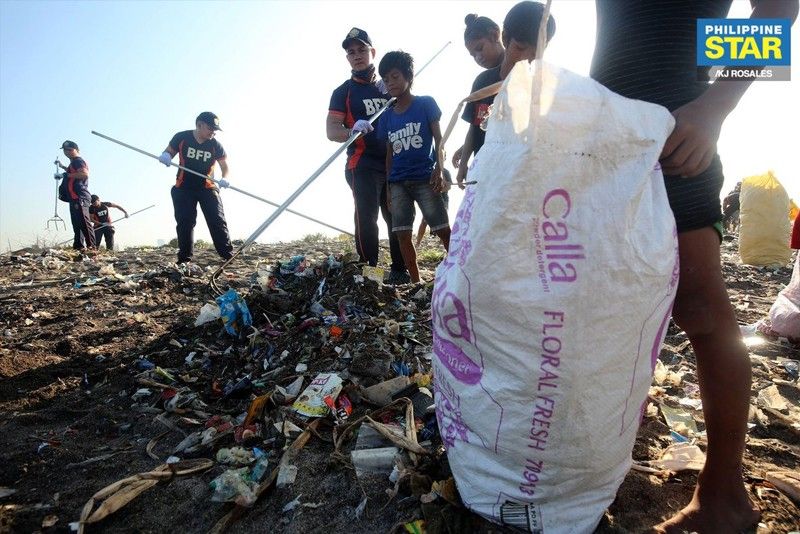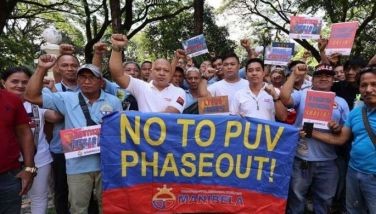Do informal settlers really contribute most of the waste in Manila Bay?

MANILA, Philippines — A fisherfolk federation is disputing a congressman's claim that informal settlers are to blame for the state of Manila Bay.
"Congressman [Elpidio] Barzaga has just exposed himself as an ignoramus on the state of Manila Bay by [claiming] that informal settlers are the main polluters," Pambansang Lakas ng Kilusang Mamamalakaya ng Pilipinas (Pamalakaya) said in a statement.
Rep. Barzaga (4th District, Cavite), the chairman of the House Committee on Environment and Natural Resources, said at a hearing that the lion's share of the blame on pollution in the bay lies with the National Housing Authority's efforts.
"We cannot clean the Bay unless we remove the illegal settlers,” he was quoted as telling representatives of the task force at the briefing.
This came in response to a claim by DILG Undersecretary Epimaco Densing, who told the House panel "that 80 percent of the pollution in Manila Bay comes from informal-settler families.”
Where does the trash come from?
However, an initial February 2019 evaluation on Manila Bay rehabilitation sent to Philstar.com by the Kalikasan People's Network for the Environment cited figures from the World Bank and the National Solid Waste Management Commission that told a much different story.
The evaluation showed that the 300,000 informal settler families targeted for relocation, around 1.38 million people, only contributed 5.01% of solid waste in the bay. Meanwhile, the collective 2.68 million population of informal settlers contributed 9.76% of solid waste.
In contrast, the country's middle-income population of 9.93 million was responsible for 48% of waste. Internationally, a study by the World Bank has shown that lower-income nations generally produce less solid waste.
A briefer on the Manila Bay rehabilitation from the Partnerships in Environmental Management for the Seas of East Asia website reads: "Most of the pollution was from land-based human activities, including the discharge of municipal, industrial and agricultural wastes, land runoff and atmospheric deposition."
Environment Secretary Roy Cimatu has also said that hotels, resorts, restaurants and similar establishments will be fined amounts ranging from P20,000 to P200,000 for violations incurred starting from the time the department started taking water samples from the bay.
"About 21 % of the organic pollution load to Manila Bay came from the Pasig River basin, with 70% of this load derived from households," the PEMSEA briefer says.
Neither Densing nor Barzaga have responded to Philstar.com's request for comment on their basis for their claims.
"He is not even residing near the coastal areas, thus he does not have any credibility to speak on behalf of the residents who truly suffer from the deterioration of Manila Bay," Pamalakaya said of Barzaga, who is a former mayor of landlocked Dasmariñas.
Industries and policies
The DILG in May said that it would summon the executives of some one thousand barangays for their lack of action to assist rehabilitation efforts. The department issued the executives show cause orders, which require parties to appear before the court to explain and justify why a particular action was not taken.
"Around 1,000 of the 5,714 barangays remain to be indifferent to our cause, making a complete mockery of our overall campaign by continuously disregarding these high-level orders for rehabilitation of the bay," DILG Undersecretary for Barangay Operations Martin Diño told reporters in a press conference.
DILG Memorandum Order No. 2019-09 directs some 178 local government units and 5,714 barangays along the Manila Bay Watershed Area to conduct their own clean-up initiatives in line with the Chief Executive’s urgency to expedite the bay’s rehabilitation process.
“It's about time these negligent officials get a lesson for not complying with and enforcing applicable and environmental laws and policies pursuant to the law,” Diño added.
A study by the DENR dated February 2019 said that only 45.41% of industries in the Manila Bay Region that were monitored from 2011-2015 are complying with the DENR Standards or have been issued Wastewater Discharge Permit. At the National level, about 50% are complying. A 2017 report from the Senate Economic Planning Office report also states that only 85 percent of solid wastes in the capital are collected.
“This means that many have been issued Notices of Violation and are still implementing measures such as construction of wastewater treatment facility so as to treat their wastewater. Or some still have pending case with payment of fines or penalties,” the study said.
Not just the bay
"Fisheries laws passed over the years have clearly favored corporate and foreign fishing interests over that of small Filipino fisherfolk and the domestic fishing industry," a situationer by the Center for Environmental Concerns said.
Barzaga earlier filed House Resolution No. 247 calling for a probe into the status of Manila Bay rehabilitation and the cleanup of water tributaries leading to it.
"First of all, we belong to the category of small earner families with very little purchasing power so there is no chance that we are capable of producing large volume of garbage,” Fernando Hicap, Pamalakaya national chairperson, said.
"This debunks Congressman Barzaga’s claim and accusation that informal settlers are the main source of pollution in Manila Bay."
The NHA estimates there are some 600,000 ISFs in Metro Manila, or about 2.8 million people—about one in every five people living in Metro Manila.
- Latest
- Trending



























